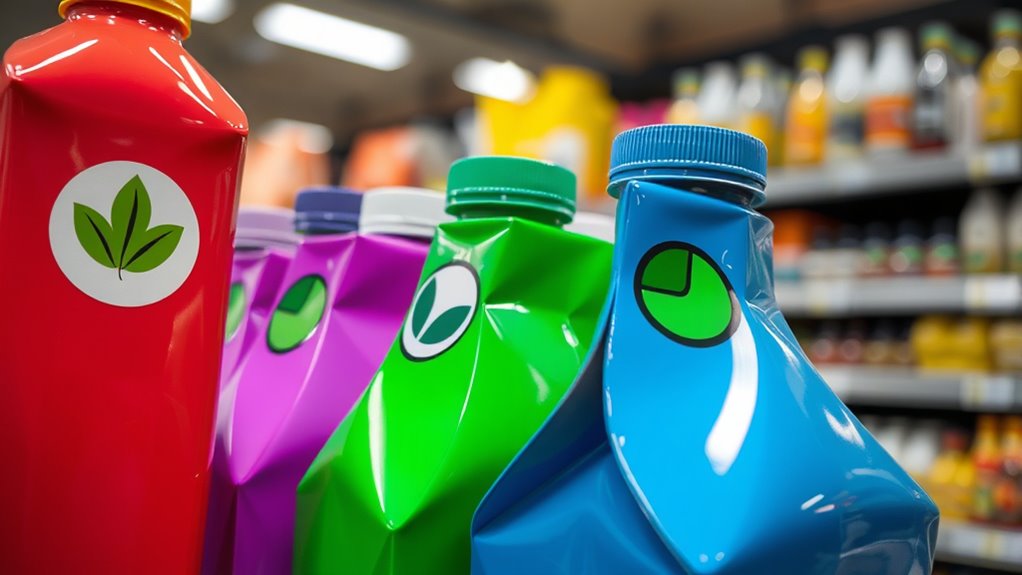Many so-called eco labels are just marketing tricks that don’t guarantee real sustainability. Labels like “eco-friendly,” “natural,” or “green” often lack independent verification or strict standards. Be cautious of certifications that aren’t verified by trusted third parties, as they might be used to attract eco-conscious consumers without genuine environmental benefits. To avoid greenwashing, focus on credible, verified certifications. Keep watching to uncover more about which labels truly matter and how to spot the false ones.
Key Takeaways
- Many eco labels lack third-party verification, making them unreliable indicators of true sustainability.
- Vague terms like “eco-friendly” or “natural” often serve as marketing ploys without certification backing.
- Some certifications are primarily marketing tools, not evidence of rigorous environmental standards.
- Consumers should research and prioritize verified certifications such as FSC or Organic for credibility.
- Greenwashing exploits consumer trust by using misleading labels that do not reflect genuine sustainable practices.

Have you ever wondered if those eco labels on products truly mean anything? It’s easy to get caught up in the idea that a small symbol or phrase guarantees a product is environmentally friendly. But the truth is, many labels are more about appealing to your eco-consciousness than providing real proof. Sustainable certifications are meant to provide assurance that a product meets specific environmental standards, but not all of them are created equal. Some certifications are rigorous, verified by third-party organizations, and genuinely ensure sustainable practices. Others, however, are little more than marketing tools designed to attract consumers who want to buy responsibly. This creates a confusing landscape where green claims can be misleading branding, making it hard to distinguish between genuine eco-friendly products and those that just look the part.
You might be surprised to learn that many labels you see on packaging are not backed by strict standards or independent audits. Some companies slap on a “green” label just to boost sales or improve their image, even if their production methods don’t align with the claims. These misleading branding tactics exploit consumers’ desire to make ethical choices, but they can mislead even the most vigilant shopper. For example, a product might carry a label suggesting it’s “sustainable” without any credible certification to support that claim. This kind of greenwashing can make it seem like a product has a lower environmental impact when, in reality, it may not be much better than conventional alternatives.
To avoid falling for misleading branding, it’s essential to educate yourself about what genuine sustainable certifications entail. Look for labels that are verified by reputable third-party organizations, such as the Forest Stewardship Council (FSC) or the Organic Certification. These certifications require rigorous standards and regular audits, so you can trust they’re more than just marketing tricks. Additionally, understanding the difference between verified eco labels and vague marketing claims can help you make more informed decisions based on credible evidence. On the other hand, be cautious of vague claims like “eco-friendly,” “green,” or “natural” without any certification to back them up. These are often just marketing buzzwords designed to appeal to your values without offering real transparency.
Ultimately, your best defense against greenwashing is to do a little research. Don’t rely solely on eye-catching labels; look into what those certifications really mean and whether they’re credible. By being an informed consumer, you can cut through the misleading branding and make choices that genuinely support sustainability. Remember, not all eco labels are equal, and some exist primarily to sell products rather than promote true environmental responsibility. Stay vigilant, ask questions, and prioritize verified sustainable certifications over superficial green claims.
Frequently Asked Questions
How Can Consumers Identify Genuine Eco-Friendly Products?
You can identify genuine eco-friendly products by checking for transparent labels that specify sustainable packaging and ethical sourcing. Look beyond just eco labels and research the brand’s commitments and practices. Trust companies that openly share their supply chain info and prioritize eco-conscious materials. Avoid products with vague claims; instead, seek certifications from reputable organizations. Your awareness helps support truly sustainable brands and reduces greenwashing.
Are There Legal Standards for Eco Labels’ Authenticity?
You might wonder if there are legal standards to verify eco labels’ authenticity. Currently, regulatory gaps and certification challenges make it tough to guarantee labels truly reflect sustainability. Laws vary by country, and many eco labels lack strict oversight, allowing false claims to slip through. To protect yourself, look for recognized certifications and do some research on the certifying organizations, ensuring you’re buying genuinely eco-friendly products.
What Are the Common Tactics Used in Greenwashing?
Think of greenwashing tactics as a wolf in sheep’s clothing. Companies often tout sustainable sourcing or carbon offsetting to appear eco-friendly, but they might not practice what they preach. They use vague language, irrelevant claims, or misleading labels to hide their true impact. By scrutinizing claims and demanding transparency, you can see through the deception and hold brands accountable, ensuring your choices genuinely support sustainability.
How Do Companies Benefit From False Eco Labels?
You might not realize it, but companies benefit from false eco labels through corporate deception, making their products seem more sustainable than they are. This boosts their branding strategies by appealing to eco-conscious consumers, increasing sales, and gaining a competitive edge. By misleading you, they can capitalize on environmental concerns without making real changes, which ultimately harms genuine sustainability efforts and erodes consumer trust in authentic eco-friendly brands.
What Impact Does Greenwashing Have on Environmental Efforts?
Greenwashing undermines environmental efforts by eroding corporate accountability and increasing consumer skepticism. When companies falsely claim eco-friendly practices, you may doubt genuine sustainability initiatives, making it harder to support truly responsible brands. This deception diverts attention and resources from effective environmental solutions, slowing progress. As a result, greenwashing hampers collective efforts to combat climate change and protect ecosystems, ultimately delaying meaningful change you want to see in the world.
Conclusion
So, next time you see an eco label, remember that appearances can be deceiving—sometimes, they’re just a coincidence, a clever marketing ploy rather than a true indicator of sustainability. Don’t rely solely on these labels; dig a little deeper to understand what they really mean. After all, the most genuine eco-choices often come down to your own research, not just a shiny badge. Trust your instincts, and don’t let a label be a mere coincidence.









